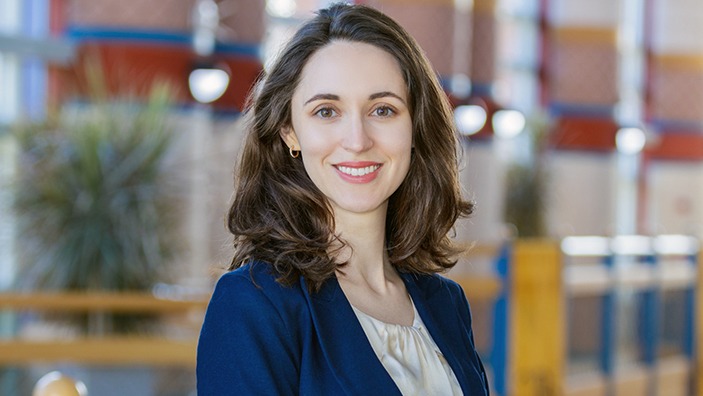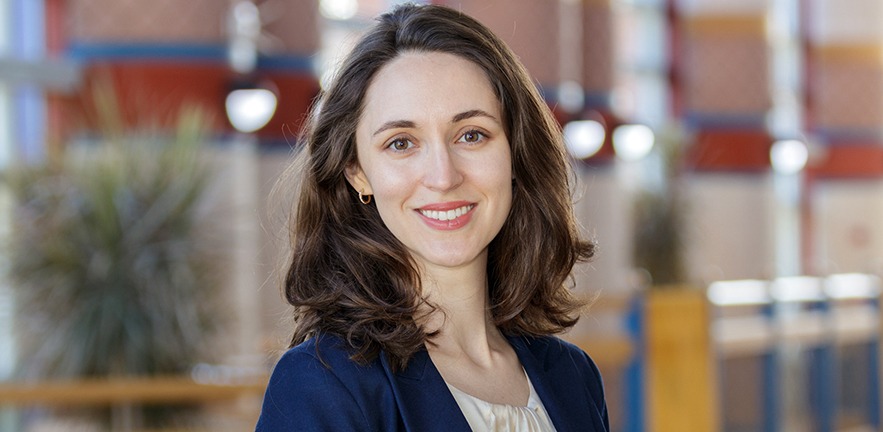PhD Candidate
BA (Smith College), MPhil (University of Oxford), MBA (Bentley University), MPhil (University of Cambridge)
Year of entry: 2020
I am a PhD student Candidate in the Organisational Theory and Information Systems group at Cambridge Judge Business School. exploring the challenges that organisations face as they innovate towards long-term social, environmental and economic sustainability. My research focuses on understanding societally transformative technologies in the context of climate change, with my PhD dissertation investigating barriers experienced by entrepreneurs, incumbents, and investors as they pursue net zero-aligned energy innovations. I am fully supported in my research as a Gates Cambridge Scholar.

Research topic
Essays on Strategic Identity Positioning and Innovation in the Energy Sector
Research interests
Entrepreneurship; innovation strategy; organisational identity; sustainable development; climate technologies.
Pathway
Organisational Theory and Information Systems
Supervisor
Biography
Ariel (Ari) de Fauconberg holds a Master of Philosophy in Innovation, Strategy and Organisation from the University of Cambridge, an MBA (Hons) from Bentley University, a Master of Philosophy in Geography & the Environment (Dist.) from the University of Oxford, and a dual BA (Hons) in Anthropology and Architecture from Smith College.
Prior to her PhD studies, Ari worked as a Research Fellow at Babson College, conducting studies on clean energy entrepreneurship and female-led, high growth, high-potential firms. She has also previously taught at the University of Oxford and Harvard Extension School, and the Cambridge Institute for Sustainability Leadership, as well as worked for the Smith School for Enterprise and the Environment and National Geographic.
As a member of the WEF Expert Network, Ari co-authored a 2021 World Economic Forum white paper on SME resilience and sustainability. She was the 2022 winner of the Financial Times and McKinsey & Co. Bracken Bower Prize for her book proposal about the pioneering work of climate technology entrepreneurs based on ethnographic research from her PhD (forthcoming).
Outside of her studies, Ari maintains ongoing interests in digital and social innovation, film, and the responsible stewardship of protected natural and cultural areas. She can often be found either running around Cambridge or rowing on the River Cam.
Publications and papers
- Selected publications
- Journal articles
- Books, monographs, reports and case studies
- Conference papers
- Blog posts
Selected publications
- Rajah, R.B., de Fauconberg, A. and Woeffray, O. (2021) Future readiness of SMEs: mobilizing the SME sector to drive widespread sustainability and prosperity. World Economic Forum White Paper.
- de Fauconberg, A., Berthon, P., and Berthon, J.P. (2018) “Rethinking the marketing of World Heritage Sites: giving the past a sustainable future.” Journal of Public Affairs, 18(2): e1655 (DOI: 10.1002/pa.1655)
Journal articles
- de Fauconberg, A., Berthon, P., and Berthon, J.P. (2018) “Rethinking the marketing of World Heritage Sites: giving the past a sustainable future.” Journal of Public Affairs, 18(2): e1655 (DOI: 10.1002/pa.1655)
Books, monographs, reports and case studies
- Rajah, R.B., de Fauconberg, A. and Woeffray, O. (2021) Future readiness of SMEs: mobilizing the SME sector to drive widespread sustainability and prosperity. World Economic Forum White Paper.
Conference papers (selected)
- de Fauconberg, A. and Grimes, M. (2024) “Values homophily in action: co-founder authentication processes during team formation.” In: Symposium on Early-Stage New Ventures: Individual Entrepreneurs, Founding Teams, and Founder-Investor Relations, Academy of Management Annual Meeting, Chicago, IL, USA.
- de Fauconberg, A. and Grimes, M. (2024) “Beyond the lean startup: a theory of entrepreneurial runways in the context of moonshot innovations.” In: Innovating for Desirable Futures: Exploring the Intersection of Innovation, Sustainability, and Time, European Group for Organizational Studies Colloquium (40th), July 2024, Milan, Italy.
- Feix, A., de Fauconberg, A., and Gruben, M. (2024) “Type I and type II greenwashing: extending the critique of CSR communications via means-ends decoupling.” In: Group for Research on Organizations and the Natural Environment (GRONEN) Research Conference, May 2024, Paris, France.
- de Fauconberg, A. (2023) “The power (and stigma) of oil: Strategic identity positioning and innovation in the energy sector.” In: European Group for Organizational Studies Colloquium (39th), July 2023, Cagliari, Italy.
- de Fauconberg, A. and Grimes, M. (2023) “The ‘real deal’: co-founder authentication processes in early-stage climate technology ventures.” In: INSEAD Doriot Entrepreneurship Conference (5th), June 2023, Singapore.
Blog posts
- de Fauconberg, A. (2024) “Bridging the gap: how climate technology entrepreneurs are redefining business value creation.” The Scholar (the Gates Cambridge Trust’s annual publication)
News and insights
A book proposal on pioneering entrepreneurial solutions to climate change by Ariel de Fauconberg, a PhD student at Cambridge Judge Business School, wins the Bracken Bower Prize of the Financial Times for best book proposal by an author under age 35.
Media coverage
Dartmouth.edu | May 2024
Irving Institute announces 2024 new Energy Summer Summit cohort
Dartmouth College’s Arthur L. Irving Institute for Energy & Society announces the selection of the 2024 summer cohort, which includes PhD candidate Ariel de Fauconberg. The group come from across the globe to the Dartmouth campus for 3 days of interdisciplinary sharing, networking, professional development, and collaboration, with the goal of breaking down disciplinary silos to catalyse new ideas.
Cambridge Festival | March 2024
From black lives matter to grassroots climate actions, Cambridge Festival asks the big questions
An announcement about a panel discussion on averting climate catastrophe featuring Ari de Fauconberg, an award-winning researcher and PhD student at Cambridge Judge Business School.
Financial Times | 5 December 2022
Bracken Bower Prize 2022: proposal for book on climate tech innovators
An FT article about Âriel de Fauconberg receiving the Bracken Bower award for authors under 35 for the ‘Before the Dawn’ book proposal.
Poets & Quants, 14 December 2022
Hope amid angst on the climate-tech front
Forbes, 21 December 2021
How ready are companies for the post-pandemic world?
World Economic Forum, 3 December 2021
Five key insights on the future-readiness of SMEs



